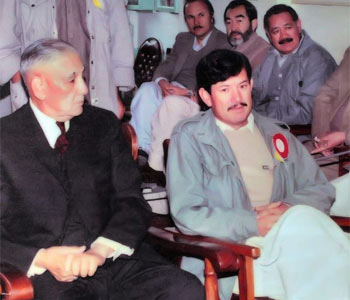Pakistan's population in the age bracket of 15-64 suffers from the devastating consequences of substance abuse. As per United Nations Office on Drugs and Crime (UNODC) survey report 6 per cent - or 6.7 million people, age 15-64 years in Pakistan used drugs in the last 12 months. Although 4.25 million individuals are thought to be drug dependent. Treatment and specialist interventions are in short supply, available to less than 30,000 drug users a year. Moreover, not all structured treatment is free of charge. Since most of the population belongs to low economic strata - almost a quarter of the population is estimated to be living on less than USD 1.25/ day, the barriers preventing access to structured treatment are exceptionally high.
Quetta being the capital and also the main business hub of Balochistan province is densely populated and drug abuse prevalence is quite evident everywhere in the city, mainly because of its geographical location and adjacent borders with Afghanistan and Iran. Street sale of the prohibited drugs is a routine matter in some localities. Habib Sewer adjacent to St. Francis Grammar School, Kansi graveyard in Pashtoonabad, Murdar Montains in Mariabad, Ayub stadium in Huddah locality, graveyard in Satellite town and Brewery - Hazara Town are notorious for open sale and purchase of illicit drugs.

In Pakistan, majority of existing treatment and rehabilitation facilities provide detoxification services only, particularly in the public sector run health facilities, and no rehabilitation program exist. Though, all district hospitals are mandated to have one ward exclusively for treatment of drug addicts. These wards however only provide detoxification facilities. Rehabilitation programs are extremely costly and demand highly motivated people to take care of drug addicts and their particular circumstances. To cater for needs of hundreds of thousands of heroin addicts alone, is beyond the capacity of any organization. However, to contribute to the Governments effort of reducing the number of drug addicts Milo Shaheed Trust (MST) plans to launch a structured treatment and rehabilitation service where the recovered & rehabilitated addicts are given skilled training in the carpentry, enabling them to earn for themselves.
Milo Shaheed Trust is the pioneer detoxification center in Quetta providing treatment to addicts since 1989. It started functioning in September 1989 informally, under the name of “Public Welfare Organization for the Control of Drug Abuse.” In May 11, 1990 the Organization was renamed as Milo Shaheed Trust for the Control of Drug-Abuse. Since its establishment, the Organization has been functioning very effectively without any discontinuation. Milo Shaheed Trust is providing residential treatment to addicts from all over the country without any discrimination of cast, religion & tribe. At MST Hospital, trained professionals treat the addicts medically and psychologically using various tools and techniques of counseling, teaching & recreational activities. They also try to bridge the gap and strengthen the relationship of addicts with their family member through family counseling and home visits.
